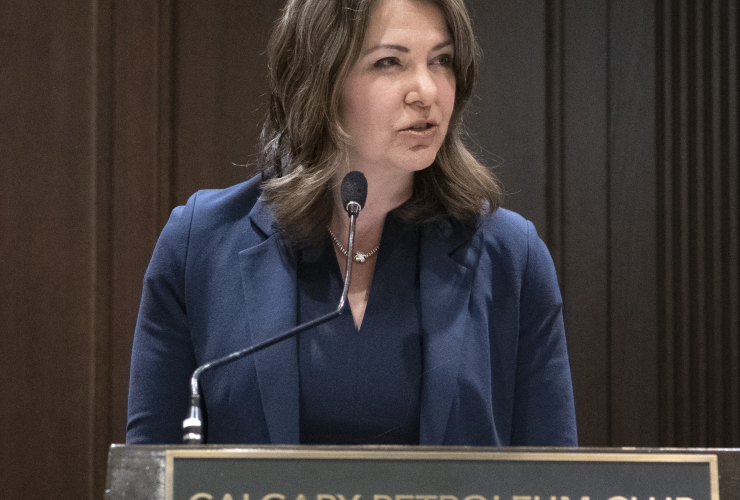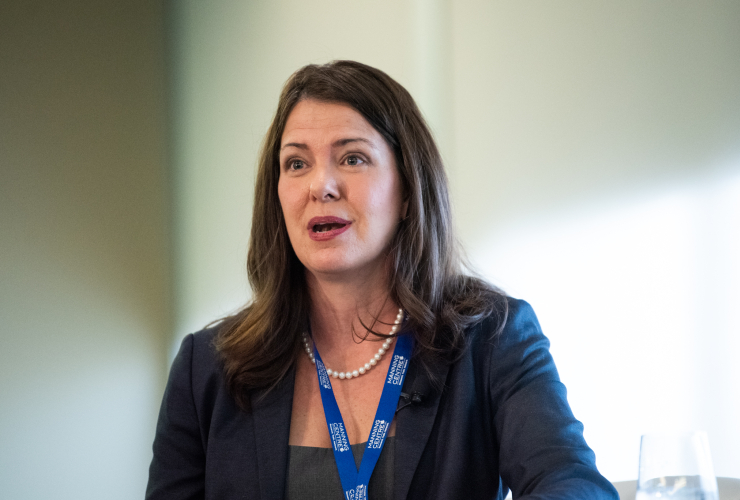Across the swift-flowing waters of the Bow River in Calgary, a blazing red sun is setting over a dark row of spruce trees that are bursting with cones, their natural response to drought conditions. The horizon is illuminated in shades of mauve, creating a stunning wildfire-enhanced sundown. Dogs run across the beach of river rock and splash joyously into the cool waters, lapping as they swim or wade just deep enough to cool their bellies. It’s a gorgeous evening after searing under intense sunshine for most of the day.
The nearby sports fields are beginning to glow beneath towering lights, while exuberant shouts and whistle blasts drift above the hum of traffic. Rows of trees surround the fields and leaves rustle in the light wind. For a moment, I feel calm and my thoughts become silent in this comforting place. A song by Imogen Heap stirs in my memory and in my mind I hear the lyrics, “There’s beauty in the breakdown.”
At what point will these water-starved trees begin to die off? There’s a biological limit to the stress they can take and this summer, the city presents undeniable evidence of trees in various stages of dying. How would this beautiful park look without the aspens, poplars and Manitoba maples? It’s entirely possible that one day, Calgary could resemble the barren landscape of El Paso where the Rio Grande runs dry after long periods without rain.
Over two million hectares of forest have burned in Alberta this year. They’re ignited mostly by lightning and careless human behaviour. However, despite a steady decline in the number of wildfires, the size and intensity of the outbreaks are increasing due to the hot and dry weather brought on by global warming. Although there is conclusive evidence that the burning of fossil fuels is responsible for creating the conditions that are resulting in massive environmental destruction, some people are unwilling to acknowledge the cause-and-effect relationship.
It isn’t just forests and urban trees that will be impacted by increasingly severe droughts and more frequent heat waves. Farmland will become less productive, crops will fail and the current allocation of water distribution licences will be insufficient as producers become ever more reliant on irrigation. The airborne particulates from wildfires will also contribute to decreases in the productivity and health of Alberta’s agricultural products.
For the second consecutive election, Albertans have chosen a conservative government that vows to fight for the fossil fuel industry. Indeed, this is a historically important sector of Alberta’s economy that generates jobs, wealth and substantial revenue for the provincial government. If it weren’t for climate change, I would agree that Alberta should take full advantage of its fossil fuel energy resources.
It’s extremely concerning that global demand for fossil fuels is at record levels and the Energy Information Administration (EIA) forecasts increasing consumption for decades to come. This is in spite of exponential growth in renewable energy capacity around the world. There is an astounding lack of concern over the IEC’s scenario. With the exception of the vast majority of climate scientists, not enough people accept the reality that a degenerative environmental cycle caused by the burning of fossil fuels will have a far greater impact on their lives than the transition from fossil fuels to cleaner energy sources.
Alberta’s six-month moratorium on approvals for renewable energy projects is an example of the kind of foolish thinking that is rooted in political ideology and stoked by misinformation campaigns and political lobbyists sponsored by Big Oil. Given the views of Premier Danielle Smith, this initial volley in the war against renewable energy should come as no surprise. However, it’s surprising that free-market conservatives in Alberta support the loss of billions of dollars in renewable energy investment, thousands of jobs and millions in revenue for landowners and rural municipalities.
A moratorium on renewable energy project approvals will not impress investors who have spent millions getting to the approval stage. Investors considering a renewable energy project in Alberta won’t waste their time on a province that says it's open for business but acts contrary to that invitation. Can you imagine what would happen if a six-month moratorium was declared on approvals for natural gas or oilsands development projects?
This roadblock for clean energy was declared without any consultation with the renewable energy industry. Perhaps a few meetings or even a courtesy call would’ve been more appropriate than a hastily convened meeting with the Canadian Renewable Energy Association minutes before the announcement was made. This was amateurish, disrespectful and exacerbated by justification based on two gems from populist misinformation campaigns.
Stoking fear over the loss of prime agricultural land to wind and solar energy has long been in Big Oil’s arsenal of simple but effective messages. But is it not the right of the landowner to decide how to best use their property to generate income? Ironically, provincial law prohibits landowners from refusing access to oil and gas resources when discovered on their land. A farmer does have the right to refuse any renewable energy project, but for at least the next six months, the government is refusing to approve the income-generating opportunities they want.
The government’s concern over the cleanup of renewable energy projects is completely without merit. Rural municipalities are equally concerned about the millions in unpaid taxes from oil companies and the billions required for cleaning up an astronomical number of orphan wells. Given that these are issues today and not potential issues decades down the road, perhaps a moratorium on drilling would be more appropriate until the backlog of orphan wells is cleaned up.
The offensive against renewable energy has begun. It doesn’t matter that heat waves, drought and flash flooding due to climate change will cause the loss of far more prime agricultural land than renewable energy. This isn’t science-based or even fact-based policy. This is the kind of policy that you get from people who believe in conspiracy theories, only love oil and gas, and are convinced the rest of Canada wants to kill their golden goose.
As climate change continues to worsen, Big Oil is destined for a day of reckoning. By then, Albertans may have already exhausted any goodwill from the majority of Canadians who want climate action, not petty turf wars.
The people of Alberta deserve better stewardship but, unfortunately, they made a choice that will have long-term consequences. Somehow the majority convinced themselves that business as usual would be OK. But it won’t be business as usual, it will be a crippling of the energy and economic diversification that Albertans have always wanted.
Rob Miller is a retired systems engineer, formerly with General Dynamics Canada, who now volunteers with the Calgary Climate Hub and writes on behalf of Eco-Elders for Climate Action.
Miller: "If it weren’t for
Miller: "If it weren’t for climate change, I would agree that Alberta should take full advantage of its fossil fuel energy resources."
Climate is not the only reason to stop using fossil fuels.
Tally the unpaid costs of deadly smog; pipeline, rail car, and oil rig explosions; oil spills; tanker collisions; industry accidents; refinery pollution; sour gas leaks; air pollution; water contamination; asthma; cancer; acid rain; toxic tailings lakes; coal mine accidents; ocean acidification.
Fossil fuel combustion produces a wide spectrum of pollutants.
Destruction on a global ecosystem scale.
Burning less fossil fuels saves many birds with one wind turbine.
Let's be clear: This
Let's be clear: This decision is NOT based in ideology. It is based in payola.
Smith is a paid employee of the oil lobby first, a narcissist second, and premier of a province somewhere well down the list. To the extent that there is something you could call an anti-renewable-energy ideology, it is incoherent and, again, was created almost entirely by the application of money. It is not a way of thinking that arose autonomously, it was created by well-funded PR, albeit tuned to resonate with real anxieties.
This policy was the product
This policy was the product of such breathtaking business incompetence and hypocrisy on energy that it's doubtful well funded PR is behind it. It seems more likely it was cooked up by a couple of ideologically drunk individuals sitting around a kitchen table late at night and announced the next morning without any PR polish, let alone a hint of professional input on its viability or counterpoint to the perfectly predictable criticism, much of it far more professional than the policy itself.
With, in round numbers, five billion bucks and 5,000++ jobs on the line, there's at least one embarrassing lawsuit in the works, especially if the "pause" in a perfectly good set of business investments is extended without a viable rationale and Big Oil leaves itself so exposed to the critics on abandoned wells, the mounting costs of tailings pond cleanup and the shameless begging for more taxpayer money to pad their already enormous profits.
Let's review the
Let's review the international situation.
The IEA has documented the phenomenal ongoing and often underestimated growth in renewables. VW and Stellantis will have huge EV battery plants up and running in three years. The US IRA policy has catalyzed North American investments in EVs and renewable energy, stimulating investors to actively look for projects outside of China which is seen as a nation about to enter a long decline. Australia is building massive solar and wind projects as well as battery plants -- enough to shut down coal fired power in the state of Victoria -- and has made plans to build the world's longest HVDC undersea cables for the export of clean power to Asia, starting with Singapore. Putin's war in Ukraine has made the EU turn against Russian fossil fuels and enter a phase of unprecedented growth in renewables, especially offshore wind backed by the largest battery packs in the world to date. Bay du Nord offshore oil exploration in NFLD is paused and will likely be cancelled due to the increasingly inconvenient economics of world oil markets. Germany is investing in East Coast hydrogen which will be exported to the EU in the form of ammonia. A German company is investing in a very large solar PV panel plant in Manitoba. And on it goes.
The demand for electricity is increasing and that demand is only at the beginning of an S curve which will get much steeper as the decade rolls on. Renewables are now cheaper than coal and gas and the intermittency issue is being quickly negated with increasingly common and more efficient battery packs. Battery chemistry is improving and getting safer and more energy dense with every laboratory breakthrough. Lithium recycling is now big business and will, with time, slow the demand for new mines. Nickel and cobalt used in batteries are being displaced by safer and more common iron, phosphate and manganese, with silicon and sodium on the horizon that will store even greater energy at lower prices.
Wind and solar on the Prairies are perfectly harmonious with farming and makes farming more profitable and attractive for rural families. Agrivoltaics is an emerging practice that has mutual benefits for both zero emission energy and food production. The Alberta electricity market was largely a free market ... until now. The market auctions for wind and solar produced results that outcompeted gas and coal, as low as 3.4 cents per kWh.
If Danielle Smith succeeds in killing off renewables in Alberta, that will present opportunities to build a renewable power industry elsewhere, such as BC or Manitoba -- provinces where incompetent anti-business conservatives do not rule. She will follow in her predecessor's footsteps and piss off a faction of the the UCP's rural base, farmers who rejected coal mining under Jason Kenney, then farmers whose livelihoods would be affected by a moratorium on profitable lease income from wind turbines and solar arrays on their land.
Then, down the timeline near the end of the decade, just as petroleum fuel is giving way in greater quantities to EVs, heat pumps and zero emission electricity, and when farmers are facing more drought and diminished opportunity to diversify their income, Alberta will find itself without an alternative to Big Daddy Oil which will still be preaching about a "100-year demand" for fossil fuels even when gas stations are disappearing.
Is that not a recipe for wailing and gnashing of teeth and eventually an exodus of young people to greener pastures?
Thanks for the poetic
Thanks for the poetic approach to the visceral tie most of us have to nature, a reminder of our hungry creature hearts.
Appealing to emotion can work for progressives too; someone should mount a massive campaign for nature.
Decades ago, I still remember the wildly successful "Participaction" fitness ads and images that were everywhere with a close-up of a young woman running through grass and a stormy sky behind, her eyes and long hair catching light and the caption underneath was, "Fitness. You've got it in you."
TAKE BACK ALBERTA,the RMA,
TAKE BACK ALBERTA,the RMA, with a pause, Smith knowing where her votes are dies what she needs.
No concern the County of Strathcona just approved the
Development change to residential from agriculture for some of the best Class one agriculture, and inthe province. How to have confidence in the UCP is increasingly difficult







Comments